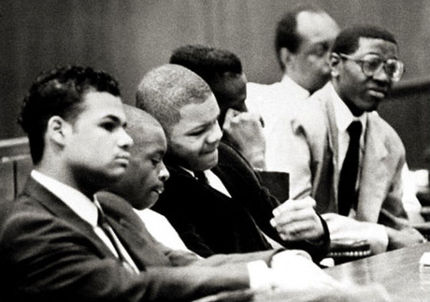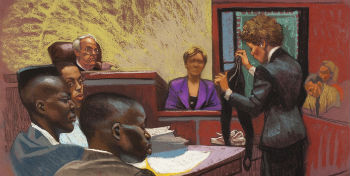Telluride 2012 Review: THE CENTRAL PARK FIVE, a Compelling Story, Competently Told

Uninterested in creating false suspense over how things will turn out, the makers of The Central Park Five begin their documentary with audio of Matias Reyes describing how he savagely beat and raped a jogger late on the night of April 19, 1989, in New York's Central Park. With that settled, the filmmakers proceed to tell the story of how five other people were convicted of the crime that Reyes committed.
The Central Park Five bears the name of acclaimed PBS fixture Ken Burns, who co-directed with his daughter, Sarah Burns, and her husband, David McMahon, after Sarah spent years researching the case. (She published a book about it in 2011.) It's a departure from Ken Burns' usual fare of historical topics like baseball and the Civil War, but the film benefits from his vast experience, coupled with his daughter's intense passion for the subject. It's a compelling story, competently told.
The basics are as follows. Five African-American boys, ages 14-16, were interrogated by police and eventually confessed to the brutal crime that left a 28-year-old woman almost dead. All five recanted their confessions in a matter of weeks, claiming police coercion. Despite that, and despite their separate "confessions" contradicting each other and the known facts, and despite the complete lack of physical evidence or DNA linking them to the crime, the five were found guilty at trial in 1990 and sent to prison. In 2002, the actual perpetrator, a serial rapist already incarcerated, confessed to the Central Park crime, which was verified by DNA evidence.
Each aspect of this story -- the crime, the arrests, the convictions, and the exoneration -- got intense media coverage nationwide, and especially in New York City. The who, what, where, and when are all common knowledge. What The Central Park Five does is explain the how and why. How did five innocent people get convicted for a crime committed by one person? Why did they confess to something they didn't do?
Those confessions, four of them videotaped by police, are the key. It's easy to understand the jury's line of thought, after all: Yes, they deny it now. Yes, there's no evidence supporting their guilt. But they confessed.
 The filmmakers interviewed all five of the boys, who are now in their late 30s, plus family members, a handful of journalists and experts, and mayors Ed Koch and David Dinkins. (No one representing New York City or its police department would comment.) They also provide valuable context for the crime and its aftermath. New York City in the '80s was a cesspool of crime, drugs, and racial tension -- a "garden of terrors," in the words of New York Times reporter Jim Dwyer. It was an environment in which the arrest of five black teens for the rape of a white woman could instantly become a firestorm, and in which a rush to judgment was almost unavoidable.
The filmmakers interviewed all five of the boys, who are now in their late 30s, plus family members, a handful of journalists and experts, and mayors Ed Koch and David Dinkins. (No one representing New York City or its police department would comment.) They also provide valuable context for the crime and its aftermath. New York City in the '80s was a cesspool of crime, drugs, and racial tension -- a "garden of terrors," in the words of New York Times reporter Jim Dwyer. It was an environment in which the arrest of five black teens for the rape of a white woman could instantly become a firestorm, and in which a rush to judgment was almost unavoidable.
The five teens who were eventually convicted of this particular crime were part of a group of about 30 black youths who were prowling Central Park that night, committing milder assaults and general mischief. The police already had several members of the mob in custody and were questioning them about the other incidents when the jogger was found; they quite reasonably suspected that the attack on the jogger was connected to the spree.
That's where things went awry. As the documentary explains, the police went almost instantly from suspecting the group of hoodlums were responsible for the rape and beating to being certain of it -- all without the introduction of any new information. The boys, young and scared, aware that they were on the hook for the things they had done, began agreeing to whatever the detectives suggested, in the hopes -- allegedly fostered by the cops -- that their cooperation would mitigate some of the punishment. It's also worth repeating that they were 14-16 years old, with no prior experience with the police.
The film briefly expands its scope beyond this specific case to comment generally on sensationalism in the media, the way interracial rape is covered differently from same-race rape, and the unfortunate fact that the men's exoneration barely got a fraction of the news coverage that their trial did.
Suitably infuriating and liable to prompt post-screening conversation, The Central Park Five is a good example of the kind of documentary that's serviceable and informative, but not particularly cinematic. The filmmakers deserve credit for assembling all the material in a way that tells the story clearly and hits the right points -- which is trickier to do than it may sound -- but there isn't much artistry to it. It's more like an interesting, in-depth article in The New Yorker than a movie.
The Central Park Five debuted at the Cannes Film Festival. It screens again at the Toronto International Film Festival. Sundance Selects has acquired distribution rights and plans a theatrical release.
The Central Park Five
Director(s)
- Ken Burns
- Sarah Burns
- David McMahon
Writer(s)
- Ken Burns
- Sarah Burns
- David McMahon
Cast
- Antron McCray
- Kevin Richardson
- Yusef Salaam
- Raymond Santana







